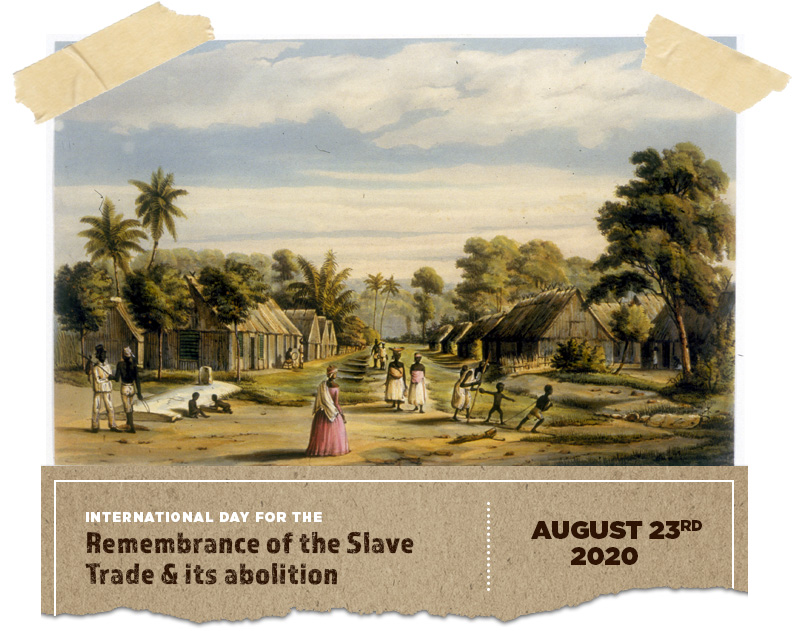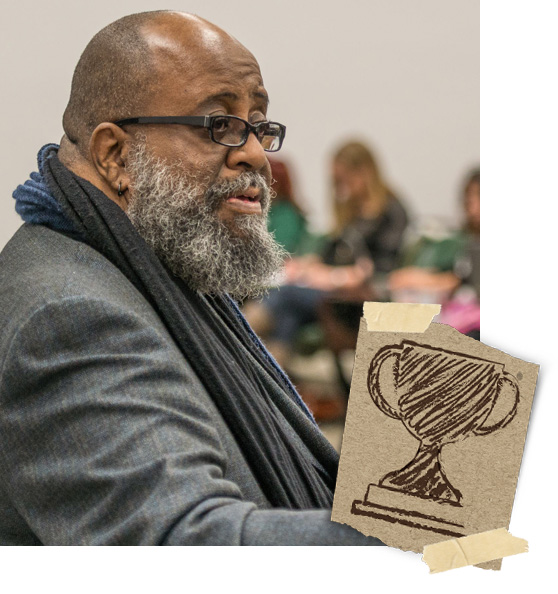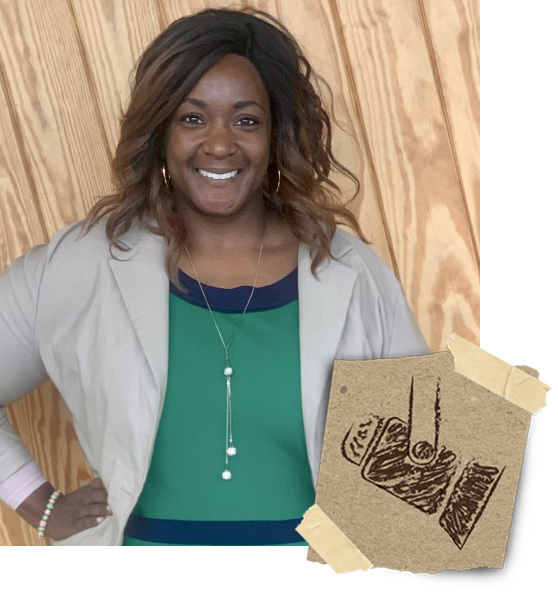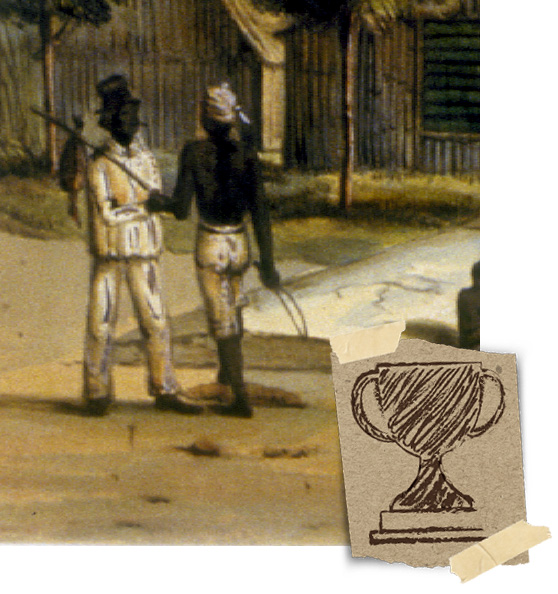Remembrance of the Slave Trade and its Abolition

Photo: A plantation village not long before the Dutch abolished slavery in 1863
Source: G.W.C. Voorduin, Gezigten uit Neerland's West-Indien (Amsterdam, 1860-1862),
plate 8. (Copy in the John Carter Brown Library at Brown University)
On August 23rd, we celebrate the “International Day for the Remembrance of the Slave Trade and its Abolition,” a UNESCO designated day to memorialize the plight of peoples of African ancestry around the world, to gain their freedom from enslavement.

Diversity Champion
Faculty/Staff
Dr. Carl Taylor
As a leading scholar of poverty, gangs, and the “third city,” in inner city Detroit, Dr. Carl Taylor has shaped our understanding of the longue durée effect of the slave trade and its abolition.

Diversity Torch
Student
Allie Klein
Allie Klein is a fourth-year undergraduate majoring in Political Science, who took a “Slavery and American Popular Culture” class with SSC’s Dean’s Research Associate Program scholar, Nakia Parker, in which she produced a paper on how black women have been imagined in selected works of popular cinema.

Diversity Spotlight
Alumni
Dr. Dee Jordan
Dr. Dee Jordan, the first student to to receive a Dual PhD in Geography, Environment, and Spatial Science and Environmental Science and Policy.

Diversity Champion
Faculty/Staff
Diversity Digital History Project
Enslaved: Peoples of the Historic Slave Trade, curated by Drs. Walter Hawthorne and Dean Rehberger, in which they compile in a single space, archives, databases, and collections that help us understand the experiences of enslaved Africans.
Additional Resources
-
Academic Suggested Readings & Databases on the Transatlantic Slave Trade & Abolition
-
Berlin, Ira. Many Thousands Gone: The First Two Centuries of Slavery in North America. Cambridge. Belknap Press, 2000 (2 nd edition).
-
Berry, Daina Ramey. The Price for their Pound of Flesh: The Value of the Enslaved from Womb to Grave in the Building of a Nation. New York. Penguin, 2017.
-
Byrd, Alexander X. Captives and Voyagers: Black Migrants across the Eighteenth-Century British Atlantic World. Reprint edition. Baton Rouge: LSU Press, 2010.
-
Christopher, Emma. Slave Ship Sailors and Their Captive Cargoes, 1730-1807. New York: Cambridge University Press, 2006.
-
Curtin, Philip D. The Atlantic Slave Trade: A Census. Madison, WI: University of Wisconsin Press, 1972.
-
Davis, David Brion. Inhuman Bondage: The Rise and Fall of Slavery in the New World. New York: Oxford University Press, 2006.
-
Diouf, Sylviane A. Dreams of Africa in Alabama: The Slave Ship Clotilda and the Story of the Last Africans Brought to America. New York: Oxford University Press, 2007.
-
DuBois, W.E. B. The Suppression of the African Slave Trade to the United States of America 1638-1870, ed. Henry Louis Gates, Jr. New York: Oxford University Press, 2014.
-
Eltis, David. The Rise of African Slavery in the Americas. New York: Cambridge University Press, 1999.
-
Hawthorne, Walter. From Africa to Brazil: Culture, Identity, and an Atlantic Slave Trade, 1600–1830. New York: Cambridge University Press, 2010.
-
Inikori, Joseph E., and Stanley L. Engerman, eds. The Atlantic Slave Trade: Effects on Economies, Societies and Peoples in Africa, the Americas, and Europe. Durham, NC: Duke University Press, 1992.
-
Kaplan, Cora, and John Oldfield, eds. Imagining Transatlantic Slavery. Basingstoke, UK: Palgrave Macmillan UK, 2007.
-
Klein, Herbert S. The Atlantic Slave Trade. 2 nd ed. New York: Cambridge University Press, 2010.
-
Lovejoy, Paul E. Transformations in Slavery: A History of Slavery in Africa, 2 nd edition. New York: Cambridge University Press, 2000.
-
Mannix, Daniel, and Malcolm Cowley. Black Cargoes: A History of the Atlantic Slave Trade, 1518-1865. New York: Viking Press, 1962.
-
Morgan, Jennifer L. “Accounting for the ‘Most Excruciating Torment:’ Gender, Slavery, and Trans-Atlantic Passages.” History of the Present 6, no. 2 (October 2016): 184–207.
-
Mustakeem, Sowande M. Slavery at Sea: Terror, Sex, and Sickness in the Middle Passage. Urbana, Ill.: University of Illinois Press, 2016.
-
O’Malley, Gregory E. Final Passages: The Intercolonial Slave Trade of British America, 1619-1807. Chapel Hill, NC: University of North Carolina Press, 2016.
-
Slave Biographies , slavebiographies.org.
-
Slave Voyages, slavevoyages.org.
-
Smallwood, Stephanie E. Saltwater Slavery: A Middle Passage from Africa to American Diaspora. Cambridge, Mass.; Harvard University Press, 2008.
-
Wheat, David. Atlantic Africa and the Spanish Caribbean, 1570-1640. Chapel Hill, NC: University of North Carolina Press, 2016.
-
Williams, Eric. Capitalism and Slavery. Chapel Hill, NC: The University of North Carolina Press, 1944.
-
-
Popular Suggested Readings/Media on Transatlantic Slave Trade & Abolition
-
The African Americans: Many Rivers to Cross with Henry Louis Gates, Jr. Episode 1: The Black Atlantic (1500-1800 ). Directed by Sabin Streeter. PBS. Aired October 22, 2013
-
Africans in America: America’s Journey Through Slavery. Part 1: The Terrible Transformation, 1450-1750. PBS.
-
Blight, Douglas. Frederick Douglass: Prophet of Freedom. New York. Simon and Schuster, 2018.
-
Bob Marley and the Wailers. Slave Driver . Recorded 1972. Track 2 on Catch a Fire. Island Records.
-
The Book of Negroes. Writers, Lawrence Hill, Clement Virgo. Director Clement Virgo. BET. Aired February 16, 2015.
-
Dunbar, Erica Armstrong. Never Caught: The Washingtons' Relentless Pursuit of Their Runaway Slave. New York. Simon and Schuster, 2017.
-
Feelings, Tom. The Middle Passage: White Ships, Black Cargo. New York: Dial Books, 2018.
-
Gerima, Haile, dir. Sankofa. 1993; Washington, DC: Mypheduh Films, Inc., 2003. DVD.
-
Hart, Phillip. Dark Passages: The Story of the Atlantic Slave Trade. PBS, 2016.
-
Hayden, Robert. “The Middle Passage” in The Penguin Anthology of Twentieth-Century American Poetry, ed. Rita Dove. New York: Penguin Books, 2011.
-
Hochschild, Adam. Bury the Chains: Prophets and Rebels in the Fight to Free an Empire’s Slaves. New York: Houghton Mifflin, 2005.
-
Tyler Parry, “Lupe Fiasco’s “Manillas” and the Material Culture of Anti-Black Violence .” Black Perspectives.
-
Roots. Part 1. Writers, Alex Haley, Lawrence Konner, Mark Rosenthal. Director Philip Noyce. The History Channel. Aired May 30, 2016.
-
“The Slave Trade and Abolition.” Historic England, historicengland.org.uk.
-
Summary: The suggested academic readings and database list provides broad overviews of the transatlantic slave trade and abolition as well as specific case and thematic studies. It includes scholarship on the development of the transatlantic slave trade, the debate over the numerical counting of people caught up in the transatlantic slave trade, but also tackles subjects such as the experiences of the enslaved during the Middle Passage, the sailors and traders involved in the daily aspects of the enterprise, the African societies affected by and involved in the international slave trade, and the international debates and controversies over abolition. In addition, gender, age, modernity, and capitalism are some of the themes used to explore these topics. The popular readings and media list allows for the exploration of popular and public memory and can be utilized as teaching tools for K-12 and college education concerning the slave trade and abolition.

